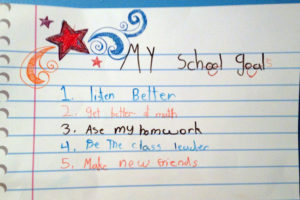Once the school year gets into full swing, it can feel like a nonstop train. It goes until the winter semester. This relentless schedule can make it hard to set goals for your family and children. So why not do it ahead of time? Here are 7 tips for ways to effectively set goals and to monitor them.
Establish a bedtime. It’s a well-known fact that sleep is essential to productivity and wellness. While many assume smaller children need the most sleep, studies show that teens need anywhere from 8-10 hours of sleep each night to perform at full capacity. Sit down with your child and establish a bedtime for school nights, and a bedtime for weekdays to ensure that they are firing on all cylinders in the classroom.
Review past grades and set custom progress report and report card goals. In an ideal world, all children earn A’s in every class. But in reality, the grading system allows us to measure aptitudes and growth areas. Make a plan for what grades you want to see on your child’s report card, and then a plan to achieve them.
Refresh study skills. One of the biggest conundrums in education is the fact that many students have never been taught how to study. One way to address this is to review a few study skills before the year begins. Many teachers assign summer reading, which is a great way to address annotating, note taking, speed-reading, color-coding and other study habits. Sometimes having a study skill memory jog can make all the difference.
Practice time management. Success in school is largely tied to time management. Help to build these sorts of skills in your child by showing them how to budget their time. Perhaps buy a written planner or agenda for them to log their assignments and due dates. Or, utilize the calendars apps offered on many smart devices and emails accounts to set reminders and note appointments. By encouraging your child to take an active role in their schedule before the year begins, they will have a better chance of maintaining the habit during the semester.

Ask your child to discuss their own personal goals. Your children may have an idea of what interests them academically, extracurricularly, and recreationally. Have a 30-minute sit-down where you both brainstorm activities, grades, events and goals that you want to achieve over the school year. Then build a calendar together in order to pace out your combined efforts to get there. Having your listening ear and support will do wonders for your little one.
Set rewards. For each and every goal that you propose, set a reward that corresponds to it. Children respond to positive reinforcement, and having them work actively toward achieving them. This makes your expectations clear, and sets the stakes for success in a straightforward with your child.

Check-In. Touch base with your student after the first week of school. The influx of class schedules friends and orientation days may have shifted their goals or put new ones on their radars. Be encouraging and open to pivoting as necessary.
